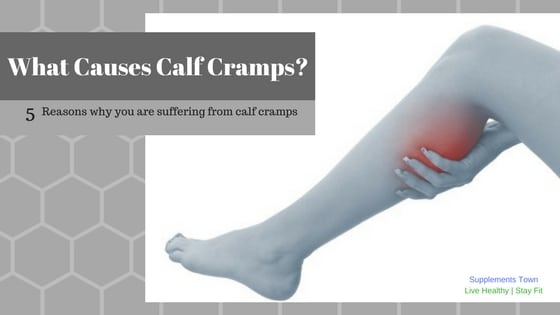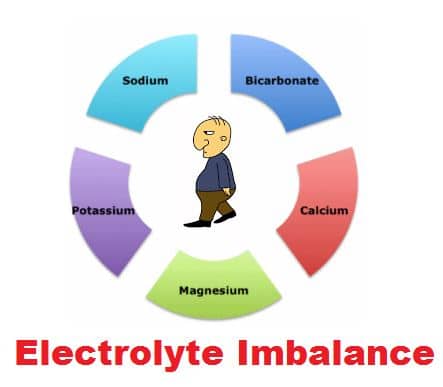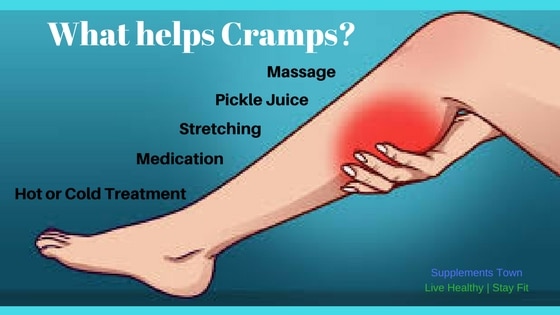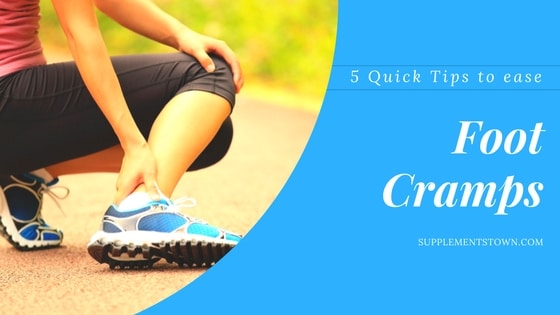Calf Cramps: What causes cramps in calves and what helps cramps
You are doing some physical activity and suddenly at a very inopportune moment you have got calf cramps. This involuntary event is so painful and intense that it unable you to move your legs. There are also times when you end up with severe leg cramps at night just before you are dozing off. Your calf muscles suddenly start to ache. They become hard and you end up in intense pain.

These Charley horses or cramps in calves are also a common site to most runners. Most times, these are so bad that the person can barely walk until the cramp get normal. So, if you are someone who is struggling with severe cramps in calves. Our article will aim to solve your problem the right way.
What Causes Calf Cramps?
The calf cramps are a sharp and a sudden involuntary contraction in the calf muscles followed by excruciating pain. The normal cramps in calves vanish in few seconds but can last for minutes depending upon the severity of cramps. The pain caused by these calf cramps can however linger up to 24 hours.

The causes of cramps in calves are unclear and there is not exact reason why we experience bad leg cramps. But there are lot of supporting factors that causes calf cramps.
- Calf Cramps due to Muscle Fatigue
Muscle fatigue is the most common cause of calf cramps. A lot of people during their day work hard and end up with fatigued muscles. This fatigue leads to unsynchronize muscles [1]. These muscles then become unable to use the required nutrients properly. In other words, they are losing nutrients more than they are using.

Furthermore, fatigue also causes accumulation of metabolic by products in the muscle fibers. These metabolites include chlorides, ADP, potassium, magnesium and lactic acid [2]. The change in the concentration of Potassium in muscle fibre is known to cause cramps in muscle [3]. It also decreases the efficiency of the muscle to perform its action.
Do you know?
If you feel cramps in calves right after any exercise, there are possible chances you are cramped due to potassium deficiency [4].
- Calf Cramps caused by Electrolyte Imbalance
Electrolyte imbalance makes a lot of people to experience cramps in calves. A lot of our modern lifestyle factors cause people to suffer electrolyte imbalance. These factors include poor diet, excessive consumption of alcohol, diuretics, and medical conditions like liver disease, hypothyroidism and kidney issues.The cause of severe leg cramps in night is a result of low magnesium in the body.

Our body is designed to contract or relax muscles by manipulating the levels of the electrolytes. Magnesium, an electrolyte is responsible for relaxation of muscle. When you are running low on magnesium, your muscles can contract but will have hard time to relax.On the other hand, the electrolyte calcium is responsible for the contraction of muscle. As you age, your body starts to accumulate calcium in your muscles [5].
This causes your muscle to become hard and contract rapidly. Probably, this is the reason you experience more foot cramps if you are in your 50 s. However, both the low levels and the high levels of calcium can be culprit behind your muscle cramps. Furthermore, if you are running low on calcium, your muscle contraction will also get affected [6].
- Inadequate Blood Supply causes calf cramps
You are not able to relate your calf cramps with your exercise routine but still getting lower leg cramps. There can be a chance that your blood supply in your leg is affected. The inadequate blood supply is referred to as Peripheral Artery Disease (PAD) in medical terms. As we have said, the patient suffering from this disease struggles with narrowed arteries and reduced blood flow in limbs. There is strong chance of PAD, if you have a history of high cholesterol, high blood pressure, obesity and diabetes.

Most Patients with PAD suffers from cramps in calves, hips and thighs. Patients with PAD also suffer from erectile dysfunction, change in color of arteries [7]. However, there can be many underline causes which relates to inadequate blood supply in your legs. So, it is always advisable you consult a doctor for possible reasons of why you are getting continuous calf cramps.
- Certain Medication cause calf cramps
You are eating healthy, not working out and see no obvious reason of why you are getting calf cramps. Think whether you have employed any new medication or made any modifications to your current medication. If you have done so, this can be a possible reason you are experiencing lower leg cramps. Certain medication can make you suffer leg cramps due to their metabolic pathways.

The medications which can give calf cramps include diuretics, osteoporosis drugs, asthma medications, certain pain medicines and conjugated estrogen medicines [8]. These medications when introduced in your body alter the electrolyte balance in your blood. Your muscle`s ability to contract and relax becomes partially affected when the electrolyte balance gets altered.
- Medical Conditions causing calf cramps
Calf cramps are often associated with some underlying medical conditions. These medical conditions include Hypothyroidism, Osteoarthritis, diabetic peripheral neuropathy, and sciatica. If you are suffering from any of these conditions, there is a chance of experiencing nerve malfunction in your legs. This nerve malfunction can cause you to suffer muscle twitching and severe cramps in calves.

Some of the medical conditions causing calf cramps also include pregnancy and menstruation. A lot of woman experience leg cramps at night during second and third trimester in their pregnancy. Some women also complain about experiencing leg cramps during their periods. This however is not normal if you experience painful leg cramps during menstruation. It can be a sign of PCOS, Fibroids and PMS.
What helps Cramps?
The calf cramps occur in importunate time and suddenly out of blue. You quickly felt your movement has been restricted and you can`t move because of cramps in calves. But fortunately, there are home remedies for cramps. Taking these home remedies is what helps cramps to get back to normal.

We have discussed above the possible causes of calf cramps. You can easily figure out the cause why you are getting the cramps. These home remedies for cramps will be helpful to ease your cramp during that certain time. You should not consider it a solution to your calf cramps but to determine the cause of cramps and treat it accordingly.
- Massaging your calves for calf cramps
A gentle massage on your cramped calves will help you release the strain of your muscle. Massaging will help you with your blood circulation around your muscle. You can also use BIOFREEZE analgesic pain reliever spray for quick action on calf cramps.
- Stretching your calves to ease calf cramps
If you occur to calf cramp, your best bet is to stretch out your calves to relieve your calf pain. Stand yourself facing towards the wall. Extend your affected leg backwards by keeping your rear knee straight. Now try to lean forward towards wall with your front leg until you feel tension in your affected leg. Hold at this position for 10 seconds and then repeat the same with other leg.
And if you can`t stand due a bad leg cramp, start by extending your toe of affected leg towards your face. Once you start to feel tension, hold at this position for 10 seconds to relieve your calf cramp. Stretching is a great way to ease your pain and overcome a painful cramp.
- Hot or Cold treatment to relief calf cramps
A hot and cold treatment on your calves is sure to provide you instant relief. You can apply ice pack on calf cramps to ease your tensed muscles. Alternatively, taking hot showers or applying hot towel on calf cramps will help you relax your calf muscles.
- Pickle Juice to trick cramps in calves
Drinking Pickle Juice can help you prevent calf cramps. The idea of drinking pickle juice sounds awful to prevent calf cramps. But many professional runners confirmed that drinking pickle juice before a run helped them prevent cramping [9].
You may now see pickle juice a way to replenish your lost electrolytes which help prevent the cramps. But pickle juice is not about electrolytes. It is the taste of pickle juice that tricks your brain. It interrupts the central nervous system pathway that creates muscle cramp.
- Over the counter Medication to prevent calf cramp pain
Non steroidal inflammatory medicine also helps you with instant relief from severe calf cramps especially if they are menstruation cramps. Ibuprofen works great in alleviating pain caused by cramps. This medication blocks the prostaglandin that is causing cramps. However, you shouldn`t use this medication if you had experienced allergic reactions towards these type of medications.
Quick Tips to avoid cramps in feet
The above information on avoiding calf cramps is sure to help you deal your problem effectively. We have also handpicked some of the great tips you should follow to end cramps in feet. These are easy and quick lifestyle tips, one should follow to avoid future problem of muscle cramps.

- A healthy diet for calf cramps
A healthy balanced diet is a must to avoid calf cramps. Your diet should include leafy green vegetables, fresh fruits, dairy products, healthy fats and whole grains. Eating a well balanced diet will ensure right dose of vitamins and minerals needed for proper functioning of your body.
You can include nuts, seeds, and green vegetables for added dose of magnesium. The dairy products like yogurt, milk and cheese are fortified with calcium. Foods like melons, potato, mango and beans are good source of potassium. Also, eat foods like cheese, pickles, carrots and celery in moderation for a good dose of sodium.
- Stay hydrated to avoid calf cramps
Calf cramps are likely to occur more if you are dehydrated. Staying hydrated is a good practice to avoid cramps in calves. You should take your hydration seriously if you are sweating heavily, exercising or doing any activity in hot temperature. Also, stay away from getting over hydrated as it can lead to electrolyte imbalance in your body.
You should stay away from gulping sugary drinks and your best bet to stay hydrated is to drink ample amounts of water in your day. A freshly prepared lemon water drink is a good way to quench your thirst after a heavy workout.
- Epsom salt to avoid leg cramps at night
Epsom salt helps you to beat leg cramps at night. This salt is fortified with magnesium and can relax your muscle in no time. Taking a warm bath at night with some Epsom salt helps you ease out your stress and release tightness around your muscle. A notable point here is for patients who are suffering from low blood pressure should stay away from using Epsom salt.
- Acupuncture and Acupressure for calf cramps
Acupuncture and acupressure is a popular technique which has a power to prevent severe cramps from reoccurring again and again. These techniques are great to improve your blood circulation in your muscles and hence can decrease bad leg cramps from occurring.
- Magnesium supplementation to reduce calf cramps
Magnesium plays an important role in muscle contraction. 78% people who experience muscle cramps are due the deficiency of magnesium in their body [10]. So, it becomes important to fix any underlying magnesium deficiency in your body. Also, as you age, you become more prone to severe cramps as calcium starts to accumulate in your body.
It is important that you include an effective magnesium supplement to meet its deficiency. You shouldn`t go for just any kind of magnesium supplement but for a magnesium supplement that has high absorption rate. Magnesium is also required by your body to properly uptake the calcium and vitamin D in your body [11]. If your body lacks magnesium to absorb calcium in your body, then it is sure to give you calf cramps.
Bibliography
| [1] | J. BIRCH, “13 Causes of Leg Cramps–and How To Stop Them,” |
| [2] | “Muscle fatigue,” |
| [3] | M. SANDOVAL, “Can Too Much Potassium Cause Muscle Cramps?,” |
| [4] | E. Schutte, “Muscle Cramps – Magnesium or Potassium?,” |
| [5] | “Calcium Causes Muscle Cramps — It is a Big Side Effect!,” |
| [6] | S. PERKINS, “Can Too Much Calcium Cause Muscle Cramps?,” |
| [7] | “Peripheral artery disease (PAD),” Mayo Clinic, [Online]. |
| [8] | J. BIRCH, “13 Causes of Leg Cramps–and How To Stop Them,” |
| [9] | “Athletes are turning to pickle juice to prevent cramps, but how does it work?,” |
| [10] | “Learn About the Importance of Magnesium for Leg Cramps.,” |
| [11] | “Magnesium is Key to Calcium Uptake,” |

Leave a Reply